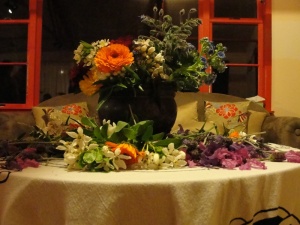Ah, spring time. It’s a tempestuous time of the year in Wellington, but the days gradually get warmer and you know it’s only going to get better.
Last weekend the grove celebrated Beltane. Below are a few thoughts on what we did for the festival this year.
The Beltane Fires

Last year we started a new Beltane tradition of keeping a Beltane fire (or fires, if we use the twin fires in the ritual) burning during the day. While Beltane is one of the four fire festivals, fire has typically been more a feature of our Samhain ritual. The warmth of the Samhain fire in the middle of winter and act of gathering around it to share in stories and food resonates strongly with all of us. It’s a time when we seek the comfort and warmth of community; when we’re all a bit weary from the dark cold winter. It also serves as a beacon fire as the veil grows thin, calling the spirits home. The veil also grows thin at Beltane, but with the warmth of the returning sun, our Beltane fire has often been more symbolic than real. Last year, one of our grovers had the idea of using the Beltane fire as more of a focal point in our ritual. Our ritual fire is now a focal point: for its ritual purification purposes, as a beacon like at Samhain, but also as a specific ritual tool.
We light the fire around midday, tend to it through the afternoon, and those who wish to can come prior to the ritual with offerings for the fire. The purpose of starting the fire early is to burn things we need or want to be rid of, items which have significance to us, but can’t just be chucked out with the ordinary. Some of the things in past burnings have included old photos, letters, legal papers, toys, items of clothing, books, art works. In this way we combine the ritual power of the Beltane fire with the wider for a slightly more practical focus: marrying the celebration and joy of Beltane with the purification of fire for the release of pent-up energy, letting go, and moving forward.
The spring winds that dominate Wellington’s spring meant we decided on the day to use the braziers rather than the bonfire: nobody wants their robe to catch fire! But there were many things to burn, dancing around the fire, and the sun was warm enough that we weren’t all huddling in front of the brazier! Later during the ritual, the braziers were used for grovers to walk between, and to burn mugwort for the purification aspect of the ritual.
Brigid’s Well

The two elemental symbols for Beltane are fire (destroyed the powers hostile to humankind, purified the air, and allowed human and beast and vegetation to thrive and become fertile) and water (healing and the time of the first swim).
As the time of the first swim of the year, a small group who arrived early set off into the forest to visit Brigid’s Well before lighting the Beltane fires.
We took with us a ribbon to tie next to the well, with the names of people we sought healing or blessing for. The forest walk was full of activity, with kakariki echoing through the trees, curious piwakwaka flitting so close you could almost touch them, and a frog leaping out of the stream as we were leaving offerings for Brighid! It seems everything was out enjoying the sun.
Eisteddfod
Our eisteddfod continues to grow, with several poems, songs, and stories shared. In the days before Beltane, I came across the poem The Sun by Mary Oliver. For me, this is a fitting celebration of spring, and also a reminder that as things get busier as we head towards Christmas, we should remember to focus on what’s important in life.
Our eisteddfod also saw the introduction of a piece of grove history – an Eisteddfod Chair! This beautifully carved chair (or bench, to be specific), made of native macrocarpa with kowhai carvings, was donated by one of our grovers. While we’re still deciding where it will be placed in the long term, it was a fitting addition to our eisteddfod and a perfect example of the productivity and creativity of Beltane.
– Nicola

